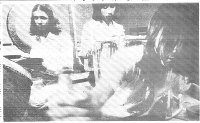|
The Temple of Dawn Consort
by Dnu Huntrakul
When meeting new people, I am often greeted with the
question: when is the Temple of Dawn Consort going to perform
again? After 24 years since the resounding day of the music group,
which included myself and friends, the question hits me as a surprise.
Always. And every time it makes me wonder, not without great pleasure,
how an impression made by music can possibly last so long.
In 1976, freshly back from long years of music studies
in the U.S. and the Netherlands, I quickly found an audience in
the young crowds of Bangkok and did not hesitate to pour onto
them the abundant load of my creation known in the West as "new
music". Our group was an unconventional combination of instruments
that hardly combined, be it in their nature of sound or in their
ethnic associations. New compositions that flowed from our pens
bursted forth with brave new ideas and almost competed to show
off the weirdest concept of sound that we could create from instruments
of various types and traits, musical and non-musical alike. Western
and Thai instruments were often coupled; electronic devices and
sounds were almost always present; percussionwares spectacularly
showcased unexpectable household items such as pots and pans,
glass urns, metal bowls, bamboo tubes, alarm clock, etc. Facetious
as it may sound, but when we went dry musically, looking into
our mothers' kitchens always gave us new inspirations.
Gaining total support from Dr. Regensberg and his
team at the Goethe Institute, with whom and where our inventiveness
never saw closed door, we ventured into various kinds of musical
activity: house concert, orchestral concert, multi-media, multi-stage
music fare, free improvisation, workshop, experimentation, etc.
We continuously experimented with new ideas, new concepts of music
expression, new directions, new horizons. Had it to be an all
out change for music in this country? Well, we did not press such
demand, but we tremendously enjoyed our kind of revolution and
did not care if we went to the extreme. We broke rules and made
the audience our enemies. Bad kids we were.
|
Anuwat
Suebsuwan
Bruce
Gaston
|
 |
Dnu
Huntrakul |
And so was our music. It was indeed the kind of music
that promised to turn your world upside down, to put you out of
context of reality, and, perhaps, to make you mad. And madly were
the receptions both for and against. Confusion and bewilderment
hung heavily on the issue until someone came up with a simple
explanation that it was, for better or for worse, the same thing
as what many Thai artists had been doing for decades in their
abstract paintings.
As it happened, this episode has played a very important
role in charting the direction of subsequent development of my
musical thoughts and commitments. With a music briefcase in my
hand, I have taken to a road so long and winding that it does
not seem to link the beginning and the end. Yet it does. I was
then a big part of the Temple of Dawn Consort. But today the daring
venture has become irrevocably a big part of me, however remote
in time and reference I have come away. And thus am I constantly
reminded.
How then do I answer the greeting question? To put
it simply, I dream of, and am committed to, the day when I shall
reappear on the stage to deliver the best I have to the loving
audience the way I once did. The details may not be the same.
But the central elements in music making shall be put to force
as full as ever. I believe in sharing good things with people
around me. And the best way I can is through music, thanks to
many individuals who have rendered me untiring support. And thanks
to the Goethe Institute who gave me the opportunity, the time,
the space, the encouragement, and kindness, all as if they had
owed it to me.
On the occasion of a timely review of their path,
I wish to express my congratulations on their past success, and
to extend my very best wishes for their brave and worthy steps
into the future of golden culture and enriching harmony among
humanity.
31 May, 2000
Ayuthaya
|